The Lazy People and the Manikins


The Lazy People and the Manikins Originally by Charles J. Finger,
Retold and Adapted by Navin
When visiting Colombia, or any country with monkeys, for that matter, one must be careful to cover their head with something while passing by woods, as monkeys 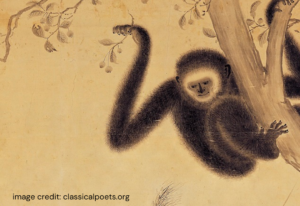 throw nuts and branches at travelers. According to the Spanish soldier and historian Gonzalo Fernández de Oviedo y Valdés, a man named Francisco threw a stone at a monkey sitting on a tree, who caught it and sent it back with force enough to knock out four or five of his teeth. Whenever Oviedo saw Francisco after that, he was always without his teeth. Now, here is the story of how these monkeys came to be…
throw nuts and branches at travelers. According to the Spanish soldier and historian Gonzalo Fernández de Oviedo y Valdés, a man named Francisco threw a stone at a monkey sitting on a tree, who caught it and sent it back with force enough to knock out four or five of his teeth. Whenever Oviedo saw Francisco after that, he was always without his teeth. Now, here is the story of how these monkeys came to be…
Once upon a time, in Colombia, there was a village of people who lived by a round small lake. There was plenty of fruit in the trees around their village and water, and the people of the village did not have to work hard to survive. It was pleasant, living that slow life, and they grew quite lazy. Over time, all their fruit skins and rinds grew into large piles, as the people were too lazy to carry these away. Soon, thousands of winged insects buzzed around the village, feeding on the waste carelessly thrown aside. The people then decided that moving their village would be easier than 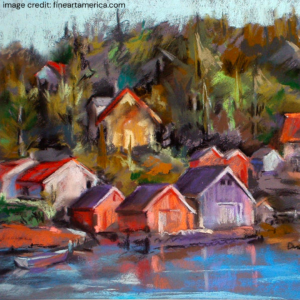 removing all the trash, so they build new huts at a new spot further down the lake’s shore. However, they remained lazy, and still did not clean up after themselves, and the winged insects swarmed them once again. The villagers decided once again to move further down the shore. The cycle kept repeating itself, and the villagers eventually found that they had built all the way around the lake and had returned to their original village. They decided that something had to be done, but nobody could seem to muster the energy to do it…
removing all the trash, so they build new huts at a new spot further down the lake’s shore. However, they remained lazy, and still did not clean up after themselves, and the winged insects swarmed them once again. The villagers decided once again to move further down the shore. The cycle kept repeating itself, and the villagers eventually found that they had built all the way around the lake and had returned to their original village. They decided that something had to be done, but nobody could seem to muster the energy to do it…
One day, an old man came to the village. He looked faded in a sort of way and his clothes were quite tattered, but he hummed and looked quite pleasant. The villagers watched him take some sticks, make a basket, and start to pick up all the discarded fruit rinds, gathering them up in one place. Every once in a while, someone would start to get up from their hammock to go and ask him why he was doing work, but it seemed too much trouble, and they would lay down to take their rest again. Finally, the head man ordered his servant Cuco to bring the old man to him. Cuco repeated the order to his own servant, Yana, who told his servant, Mata, 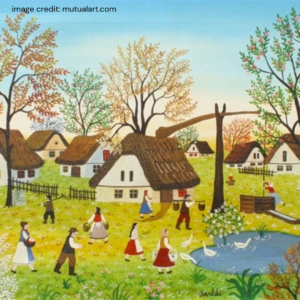 who told his servant, Pera, who told his servant Racas, who told a village boy, who told the old man. The old man went with the boy, who gave him to Racas, who gave him to Pera, who gave him to Mata, who gave him to Yana, who gave him to Cuco, who finally gave him to the head man.
who told his servant, Pera, who told his servant Racas, who told a village boy, who told the old man. The old man went with the boy, who gave him to Racas, who gave him to Pera, who gave him to Mata, who gave him to Yana, who gave him to Cuco, who finally gave him to the head man.
Now, the whole village gathered to see what was going on.
“Who are you, and what do you want?” asked the head man. “I do work. I want to know what you need done and to make sure that it is done,” replied the old man. “What kind of work do you do?” asked the head man. “All kinds!” said the other. He proceeded to list every type of work known to man. At this, many of the people listening began to shout offers of pay for the old man, if he would complete their tasks for them. The man stoutly refused any pay and moved away from the group. He took up some sticks and began to whittle them into small figures. Each had a handle like a tail. The old man went on till there were many manikins, and at that point, he stood in front of them, like an army general. He spoke a few strange words and moved his hands about in odd ways, and lo and behold! The manikins all stood to attention and began to move about, forming lines in front of each of the villagers. They bowed to the villagers and nodded their heads. “I have made twenty manikins for each of you, and they will follow your commands. You may designate what kind of work they do. They must eat and sleep, but they otherwise will do only your bidding.”
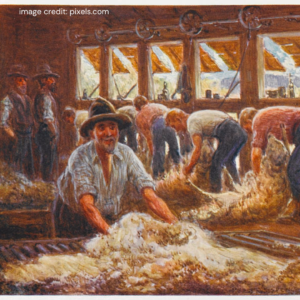 After this, each villager told his or her figures to do his or her own task. For example, the fishermen, cassava bread makers, sheep shearers, laborers, and pot makers told each of their 20 figures to be fishers, cassava bread makers, sheep shearers, laborers, and pot makers, respectively. The little figures went about their work with a will, never tiring of it. The people could just rest on their hammocks and watch the wooden people work. Soon though, the children of the village became upset that they did not have dolls to do their chores for them. They went as one to the old man, and hearing their complaints, he immediately carved out twenty figures for each of the children. These went about as dutifully as the others.
After this, each villager told his or her figures to do his or her own task. For example, the fishermen, cassava bread makers, sheep shearers, laborers, and pot makers told each of their 20 figures to be fishers, cassava bread makers, sheep shearers, laborers, and pot makers, respectively. The little figures went about their work with a will, never tiring of it. The people could just rest on their hammocks and watch the wooden people work. Soon though, the children of the village became upset that they did not have dolls to do their chores for them. They went as one to the old man, and hearing their complaints, he immediately carved out twenty figures for each of the children. These went about as dutifully as the others.
The old man eventually had to make figures for each of the figures as well, as they could only do one job at a time. And because all of these figures had to eat, the old man had to make thousands of figures to make food and carry water. The figures were everywhere, even inside houses. The people had tried to shut them out, but then special door opener figures had been made to open the doors. The sheer number of figures on duty rushing about and doing their tasks made one’s head swim, and there were hundreds of manikins sleeping in piles in corners, and some sleeping while dangling from rafters by their tails. The old man soon made guardas, figures whose job it was to maintain order. These guardas stood everywhere, alert and officious, and the people had to watch where they walked to avoid stepping on any of the manikins.
Finally, the villagers held a meeting. “Something must be done!” cried the head 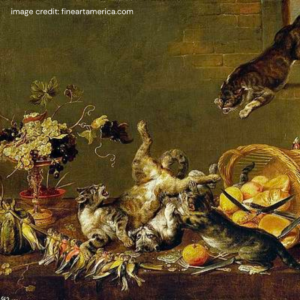 man. “If you please, sir, everything is being done,” said the old man. “I think…” began a man. “Please sir, don’t do that. We have figures to do the thinking,” interrupted the old man. “I can’t even remember what life was like before these dratted figures came to be!” cried another villager. “Don’t remember! That would be breaking the contract! There are manikins to do the remembering!” cried the old man. Finally, a small boy spoke up. “Without anything to do, I feel like a nobody! All I want is some elbow room,” he said. This notion was agreed upon by all the villagers present. “I’ll see what can be done…” said the old man thoughtfully.
man. “If you please, sir, everything is being done,” said the old man. “I think…” began a man. “Please sir, don’t do that. We have figures to do the thinking,” interrupted the old man. “I can’t even remember what life was like before these dratted figures came to be!” cried another villager. “Don’t remember! That would be breaking the contract! There are manikins to do the remembering!” cried the old man. Finally, a small boy spoke up. “Without anything to do, I feel like a nobody! All I want is some elbow room,” he said. This notion was agreed upon by all the villagers present. “I’ll see what can be done…” said the old man thoughtfully.
He left the villagers and went into the woods. After making one last set of figures, hundreds of them, he gave them their duty and left the village forever, chuckling. Soon, these last figures rushed into the village clamoring “Elbow room! Elbow room!” They began pushing and beating the other manikins, who began beating them back. Soon, the guardas arrived and began beating all the manikins around with their sticks. In the confusion, all the real people fled the village and ran to the opposite side of the lake, where they cleaned up their old rinds and built a new village. From that day on, the villagers did all their duties themselves, and it seemed that the water they drank, the food they made, and the rest they enjoyed after a hard day’s work were sweet as never before.
Meanwhile, in the other village, it was manikin versus manikin. Many of the manikins kept up their work as before, but the Elbow-roomers hindered them greatly, roaming about the village in large groups and driving the workers aside. The manikins had nobody to serve and became mischievous. For example, the pot cleaners had a fight with the pot makers, and decided to break all the pots so that the pot makers would have more work to do. The clay diggers and clay gatherers consequently had to work harder, which meant that they were hungrier. The fruit gatherers had more to do, and the cassava bread bakers had to work double-time. The fire builders for their ovens, and the woodcutters also, had keep busy.
Eventually, the Elbow-roomers began to push and shove the other animals around, and the panthers, hens, goats, dogs, and all the animals of the forest had had enough. Finally, the day of reckoning came for the manikins. The animals fell upon them, throwing them into corn grinders and fires, spilling hot water on them, and destroying them in any way possible. Suddenly, there came lightning and rain so heavy that the manikins, who were running hither thither in terror, lost their wits. The ones that escaped the wrath of the animals fled into the trees, where they eventually grew hair and became monkeys. To this day, however, they hate humans for the trouble they got them into, and hurl nuts and sticks at those passing by to attempt to get revenge.









